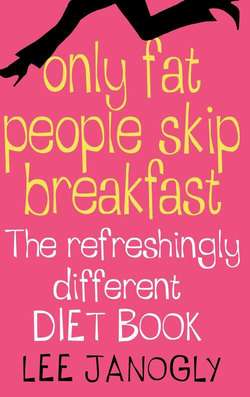Читать книгу Only Fat People Skip Breakfast: The Refreshingly Different Diet Book - Lee Janogly - Страница 34
The Triumph of Hope over Experience
ОглавлениеYou would think that people who have spent their adult years failing at diets would be relieved to discover that they don’t have to try every new one that comes out. But that’s not the case. If there is the slightest suggestion that they might be able to ‘Get Slim for Summer’, they want to give it a try.
Professor Janet Polivy, from the psychology department at the University of Toronto, conducted some very interesting research studies a few years ago. She found that simply going on a diet disrupted people’s physical sense of when and how much to eat – and this led to overeating. In experiments where dieters had to eat a high-calorie snack, thereby purposely breaking their diet, they ate much more than non-dieters in the same situation. Furthermore, they ate more than non-dieters when they believed the snack was high-calorie, even when it was in fact low-calorie.
In tests where dieters thought they were being watched after breaking their diet, they ate very little; but afterwards, when they thought they were alone, they would binge. Again and again the researchers provided evidence for what they came to call the ‘what-the-hell’ effect of overeating after breaking a diet—and what I call the ‘Oh sod it!’ syndrome.
Every time you put yourself on a strict diet you are trying to train yourself to give precedence to what the diet allows over what the body demands. That would be fine if the body demanded only what the diet allowed but this is rarely the case. The crucial problem with all restrictive dieting is that it drives a wedge between the person and her body; a struggle ensues and generally the situation deteriorates until the dieter has wrecked the natural signals, since these signals are what the diet is designed to over-ride.
So out goes eating on the basis of natural hunger cues and in come calorie calculations or peculiar nutritional combinations, in particular the current fashion of cutting out entire food groups such as wheat, dairy, tea, coffee, sugar and alcohol. This leads to emotional bingeing and being controlled by the vast swathes of foods you are trying to eliminate.
This turns you into a binger, eating on the basis of compulsion, obeying mysterious urges to eat that correspond neither to the original hunger that is entirely natural nor even to the diet that you substituted for natural eating.
‘Low-fat’ doesn’t mean ‘not fattening’ if you eat a lot of it.
